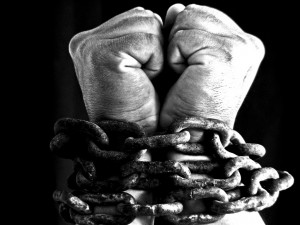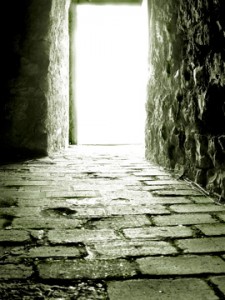
On Saints’ Days (feasts) and all Church festivals the Night Office should be ccarried out as on Sunday, the exceptions being that the psalms, antiphons and lessons are to be appropriate to these days.
Why remember the saints?
Coming from the reform tradition, i.e. protestant, this chapter may cause some of my brothers and sisters some confusion or a desire to pass over this short chapter as unimportant. Having grown up in the Roman Catholic Church, however, I have had to understand the importance of saints and, although I reject the need to pray to saints in time of need, I do see the benefit of identifying with them in the ‘communion of saints’. Spending a day meditating on the life of Christians who have died in the faith and, sometimes, for the faith is a great practice. It helps to inspire, challenge and encourage us in our own walk of transformation into the likeness of Christ.
On 24th March 1980, Oscar Romero, bishop of El Salvador, was assassinated whilst presiding at the Eucharist in a small chapel. This year I was reminded of his life and witness via ‘Daily Prayer’ of the Northumbria Community which gives a brief biography of particular saints on their feast day. Romero is a particularly significant Christian figure for me. When I was a teenager in the Roman Catholic Church I went through Confirmation, a rite of passage for any Christian who wants to take personal ownership of the faith given to them through Baptism. Now is not the time to explore the development of the rite/sacrament of Confirmation but it just needs to be said that, in my church at the time, it was customary to take the rite of Confirmation when you were 16 years old.
During the Confirmation service in the Roman Catholic Church the candidate chooses a saint’s name to be given. This is an interesting practice and should create an opportunity for the Christian to rename themselves and to have a development in identity as they try to identify with a saint of the Church. Unfortunately for our church, and the poor Archbishop who presided over our Confirmation, as teenagers, we didn’t take this very seriously and our year had chosen the most obscure saints names, not because of the example they set or the affinity we felt with them but merely to try to confuse the Archbishop (I’m sorry to him!) And so, one after the other, the Archbishop renamed teenagers in Tunbridge Wells,
Bonaventure, Sexburga, Zynovij, Bairfhoin…
And after these came me,
Odo.
So technically, I could write that my full name is Edward James Odo Lunn. I don’t!
After my Confirmation, as a group, we started a new youth group for those post-Confirmation. Our parish priest at the time, one Fr. Michael Evans, a godly man to whom I have been inspired throughout my life, named this group the Romero Group. We were introduced to the name and it was met with blank faces from all. Fr. Michael then introduced us to the life and death of Oscar Romero…
If I had known this story before my Confirmation, then I’m sure I’d have had the great privilege of naming my desire to emulate the walk of disciples to Jesus of Oscar Romero. Ever since hearing his story, told so passionately by Fr. Michael on that Sunday evening, Romero has been, in my mind, an exemplar of what being a disciple is like.
So on 24th March this year I dedicated the day to reflecting on Romero’s life and death. I changed my profile picture to a photograph of him and published some quotes and my reflections. You can read some of what Oscar Romero did and said here. The main thing I admire about Romero was the way he both remained steadfast in his faith and theology whilst adapting to the context in which he found himself. He was appointed to the Episcopal See of El Salvador because he was a conservative traditionalist and was deemed a ‘safe pair of hands’ in a time of great uncertainty and uprising in the lower classes. He remained, in my eyes, conservative and traditionalist but, after his Jesuit friend was killed, Romero’s ministry developed and he began standing with the poor and marginalised, to fight injustice. he did not betray his heritage or tradition, nor did he waiver in his theological standpoint but he grew into a deeper understanding of this.
I see the same characteristics in the new Pope Francis. It is the Catholic Church, based in the home of liberation theology, South America, which manages, in my opinion, to balance the love and commitment to Scripture and Tradition, and, at the same time, reveal the open love of God through Jesus Christ. There is no compromising at any point. It is a difficult and rare skill to be able to stand in that point of apparent paradox and contradiction that the power of God’s love is shown. Oscar Romero epitomises this ability to me and reveals Christ and it is this that I seek to grow into, with the help of God. To spend a day praying this prayer for help is a worthwhile and valuable thing to do.
But be warned: it is easy to read into the lives of the departed saints what we want to see. No doubt I have done this with Romero and with countless other saints I admire. It is a natural human instinct to make gods/idols in our own image; we’ve done it with Jesus, we can do it with one of his disciples. Take, St Aelred of Rievaulx, as an example. On his feast day (12th January) there was a flurry of articles and reflections on the question of St. Aelred’s sexuality. His most famous work is ‘Spiritual Friendship’ which is an excellent book on community and relationships. In this book St. Aelred’s relationship with younger monks, depicted in a series of dialogues with them, seems to be very close and intimate. In St. Aelred’s monastery, of which he was the Abbot, he allowed/encouraged monks to hold hands and to meet each other with a holy kiss. All this could be seen as an open acceptance of homosexuality within the monastery. I do not deny that St. Aelred is indeed encouraging close intimacy between brothers (and sisters) and is akin to that of a romantic couple but I refute that this necessarily means that he condoned homesexual practice. I doubt very much if he would remain as an abbot if he had been so ‘progressive’.
I love St. Aelred and his ideas about deep commitment between people of any gender. I encourage that sort of relationship now, same sex or opposite sex, but the complication comes when we discuss the matter of the sexual act and to immediately suggest that one must contain the other is a fallacy.
What upset me on the feast day of St. Aelred was the ease with which people ‘out’ed a dead man. Whether he struggled with his sexuality or not; whether he always wanted to admit to his superiors his same sex attraction or not is not our job to say for him. That action has been dealt with between St. Aelred and his God. However much we feel we are doing St. Aelred a justice in proclaiming his perceived sexuality, it is not our place and nor the reason he should be remembered. St. Aelred, along with all the saints, should be remembered for their proclamation and witness to God. For St. Aelred and Romero this must be only what they said and did not what we hoped they said and did.
Reflection
To connect ourselves with past Christians from a bygone era seems a dangerous thing to do to us in a progressive generation whose obsession with our own ability to ‘improve’. We are in an age where all progress is good progress and we are growing in enlightenment. We are now more informed and more rational than any generation before us and we are building on the past in positive and constructive ways. Unfortunately, the same could be said of the people in Babel. We reached a climax of this thinking during the 20th century when all our intelligence and rationality, all our philosophies and ethics culminated in the possibility of two World Wars and a death toll unimaginable before. Despite this fact, we still consider ourselves as evolving and improving.
For me, remembering saints, reading and learning the tradition holds and protects me from considering that I am in anyway unique or special without a great cloud of witnesses behind me. If I cut myself off from their example and their lives and deaths, I isolate myself. I leave myself open to the temptation and fallacy that I am an island and able to survive without God. I build a tower of my own to reach the heavens in an attempt to displace God from His throne and take charge of the whole world…
Many have tried. All have failed. Alleluia!
Lord, Jesus Christ, Son of God, have mercy on me, a sinner. Draw me closer to yourself, through the crowd of saints who gather round your throne where they worship and adore you for your amazing sovereignty, grace and love.
Come, Lord Jesus.
 I have had the privilege of being welcomed into a community over the last year which has had an ongoing and deeply transformative impact on me and my vocation as an ordained priest. The community are mainly in their twenties and would, at a cursory glance, be classified as ‘arty’ intellectual types, although this is not entirely true; not that they are not either of those things but that which unites this group isn’t those two general categories. It is only in the last month or so that I have begun to grasp the ‘charism’, the ‘je ne sais qua’, of Burning Fences.
I have had the privilege of being welcomed into a community over the last year which has had an ongoing and deeply transformative impact on me and my vocation as an ordained priest. The community are mainly in their twenties and would, at a cursory glance, be classified as ‘arty’ intellectual types, although this is not entirely true; not that they are not either of those things but that which unites this group isn’t those two general categories. It is only in the last month or so that I have begun to grasp the ‘charism’, the ‘je ne sais qua’, of Burning Fences. Before I stumbled through the doors one cold December night, this community had been meeting, singing and telling stories for a year or more. They had produced a CD of songs which they had developed entitled ‘Of Anthem and Ashes’. The images that were resonating with them then and remain reverberating through our times together are phoenix like resurrections; songs sung in the rubble, new plants breaking through concrete. These images have always resonated with me and it’s why I know I am a ‘fence burner’.
Before I stumbled through the doors one cold December night, this community had been meeting, singing and telling stories for a year or more. They had produced a CD of songs which they had developed entitled ‘Of Anthem and Ashes’. The images that were resonating with them then and remain reverberating through our times together are phoenix like resurrections; songs sung in the rubble, new plants breaking through concrete. These images have always resonated with me and it’s why I know I am a ‘fence burner’. The times when Church is most frustrating, for me, is in the ‘necessary organization’. What irks me is the lack of convincing Biblical precedent. The Temple system failed and yet here we are in the 21st century rebuilding it. I get it, organic is messy and uncontrollable, unpredictable but it’s how the world functions. We human beings are devastating when we control and tinker with the organic creation. We’ve tried to organize the world and what we discover is we’re trapped in boxes which do not fit nor encourage us to flourish in the ways in which we should.
The times when Church is most frustrating, for me, is in the ‘necessary organization’. What irks me is the lack of convincing Biblical precedent. The Temple system failed and yet here we are in the 21st century rebuilding it. I get it, organic is messy and uncontrollable, unpredictable but it’s how the world functions. We human beings are devastating when we control and tinker with the organic creation. We’ve tried to organize the world and what we discover is we’re trapped in boxes which do not fit nor encourage us to flourish in the ways in which we should.

 Where he came from, neither of them knew. How he got past their captors; who could say? He was either a fraud, one of the warders provoking them for his own amusement; or their captors had fled leaving the cell unguarded; or it was a miracle. None of this mattered much as he walked over to them and spoke.
Where he came from, neither of them knew. How he got past their captors; who could say? He was either a fraud, one of the warders provoking them for his own amusement; or their captors had fled leaving the cell unguarded; or it was a miracle. None of this mattered much as he walked over to them and spoke. Through the doors they saw their guards sleeping soundly. It seemed so strange – no – illogical that they could slumber during a rescue mission in the jail they were meant to watch. The whole incident was feeling so mysterious and implausible; a dream with no reason. Yet this man kept leading them down the corridor towards a bright light; the final exit to freedom.
Through the doors they saw their guards sleeping soundly. It seemed so strange – no – illogical that they could slumber during a rescue mission in the jail they were meant to watch. The whole incident was feeling so mysterious and implausible; a dream with no reason. Yet this man kept leading them down the corridor towards a bright light; the final exit to freedom.